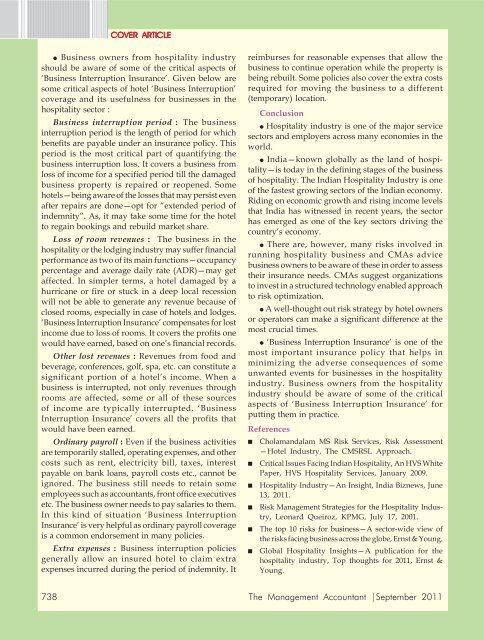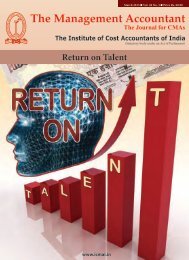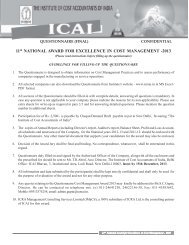This Issue - Icwai
This Issue - Icwai
This Issue - Icwai
You also want an ePaper? Increase the reach of your titles
YUMPU automatically turns print PDFs into web optimized ePapers that Google loves.
COVER COVER ARTICLE<br />
ARTICLE<br />
● Business owners from hospitality industry<br />
should be aware of some of the critical aspects of<br />
‘Business Interruption Insurance’. Given below are<br />
some critical aspects of hotel ‘Business Interruption’<br />
coverage and its usefulness for businesses in the<br />
hospitality sector :<br />
Business interruption period : The business<br />
interruption period is the length of period for which<br />
benefits are payable under an insurance policy. <strong>This</strong><br />
period is the most critical part of quantifying the<br />
business interruption loss. It covers a business from<br />
loss of income for a specified period till the damaged<br />
business property is repaired or reopened. Some<br />
hotels—being aware of the losses that may persist even<br />
after repairs are done—opt for “extended period of<br />
indemnity”. As, it may take some time for the hotel<br />
to regain bookings and rebuild market share.<br />
Loss of room revenues : The business in the<br />
hospitality or the lodging industry may suffer financial<br />
performance as two of its main functions—occupancy<br />
percentage and average daily rate (ADR)—may get<br />
affected. In simpler terms, a hotel damaged by a<br />
hurricane or fire or stuck in a deep local recession<br />
will not be able to generate any revenue because of<br />
closed rooms, especially in case of hotels and lodges.<br />
‘Business Interruption Insurance’ compensates for lost<br />
income due to loss of rooms. It covers the profits one<br />
would have earned, based on one’s financial records.<br />
Other lost revenues : Revenues from food and<br />
beverage, conferences, golf, spa, etc. can constitute a<br />
significant portion of a hotel’s income. When a<br />
business is interrupted, not only revenues through<br />
rooms are affected, some or all of these sources<br />
of income are typically interrupted. ‘Business<br />
Interruption Insurance’ covers all the profits that<br />
would have been earned.<br />
Ordinary payroll : Even if the business activities<br />
are temporarily stalled, operating expenses, and other<br />
costs such as rent, electricity bill, taxes, interest<br />
payable on bank loans, payroll costs etc., cannot be<br />
ignored. The business still needs to retain some<br />
employees such as accountants, front office executives<br />
etc. The business owner needs to pay salaries to them.<br />
In this kind of situation ‘Business Interruption<br />
Insurance’ is very helpful as ordinary payroll coverage<br />
is a common endorsement in many policies.<br />
Extra expenses : Business interruption policies<br />
generally allow an insured hotel to claim extra<br />
expenses incurred during the period of indemnity. It<br />
reimburses for reasonable expenses that allow the<br />
business to continue operation while the property is<br />
being rebuilt. Some policies also cover the extra costs<br />
required for moving the business to a different<br />
(temporary) location.<br />
Conclusion<br />
● Hospitality industry is one of the major service<br />
sectors and employers across many economies in the<br />
world.<br />
● India—known globally as the land of hospitality—is<br />
today in the defining stages of the business<br />
of hospitality. The Indian Hospitality Industry is one<br />
of the fastest growing sectors of the Indian economy.<br />
Riding on economic growth and rising income levels<br />
that India has witnessed in recent years, the sector<br />
has emerged as one of the key sectors driving the<br />
country’s economy.<br />
● There are, however, many risks involved in<br />
running hospitality business and CMAs advice<br />
business owners to be aware of these in order to assess<br />
their insurance needs. CMAs suggest organizations<br />
to invest in a structured technology enabled approach<br />
to risk optimization.<br />
● A well-thought out risk strategy by hotel owners<br />
or operators can make a significant difference at the<br />
most crucial times.<br />
● ‘Business Interruption Insurance’ is one of the<br />
most important insurance policy that helps in<br />
minimizing the adverse consequences of some<br />
unwanted events for businesses in the hospitality<br />
industry. Business owners from the hospitality<br />
industry should be aware of some of the critical<br />
aspects of ‘Business Interruption Insurance’ for<br />
putting them in practice.<br />
References<br />
■ Cholamandalam MS Risk Services, Risk Assessment<br />
—Hotel Industry, The CMSRSL Approach.<br />
■ Critical <strong>Issue</strong>s Facing Indian Hospitality, An HVS White<br />
Paper, HVS Hospitality Services, January 2009.<br />
■ Hospitality Industry—An Insight, India Biznews, June<br />
13, 2011.<br />
■ Risk Management Strategies for the Hospitality Industry,<br />
Leonard Queiroz, KPMG, July 17, 2001.<br />
■ The top 10 risks for business—A sector-wide view of<br />
the risks facing business across the globe, Ernst & Young.<br />
■ Global Hospitality Insights—A publication for the<br />
hospitality industry, Top thoughts for 2011, Ernst &<br />
Young.<br />
738 The Management Accountant |September 2011




